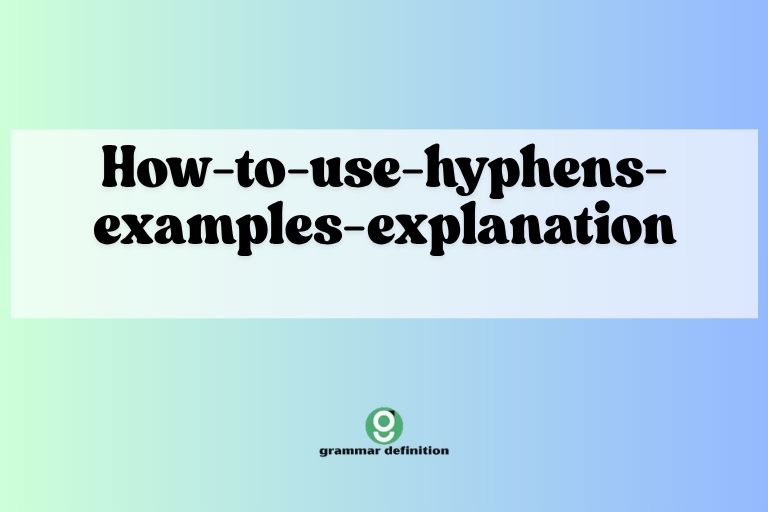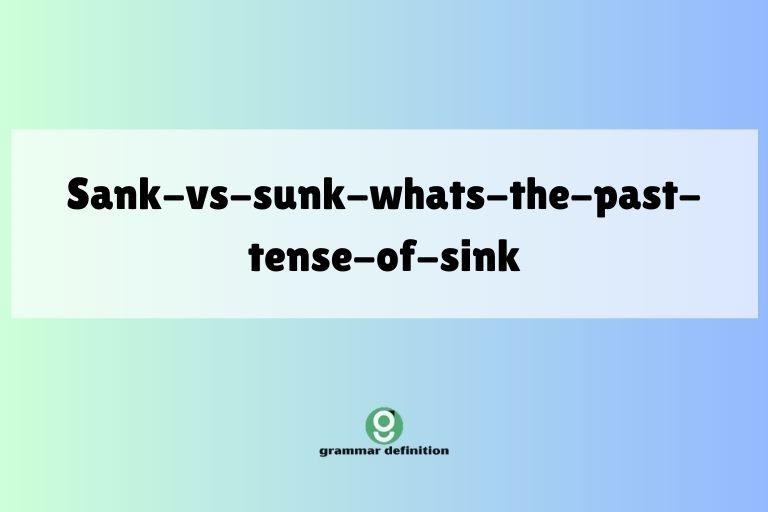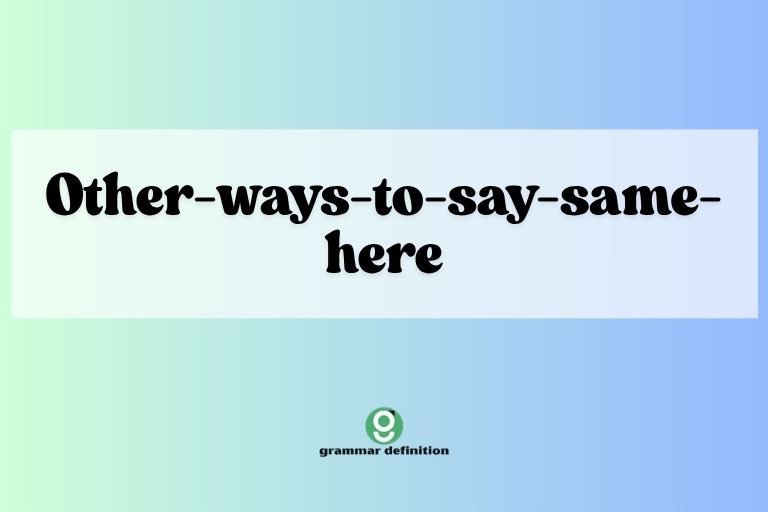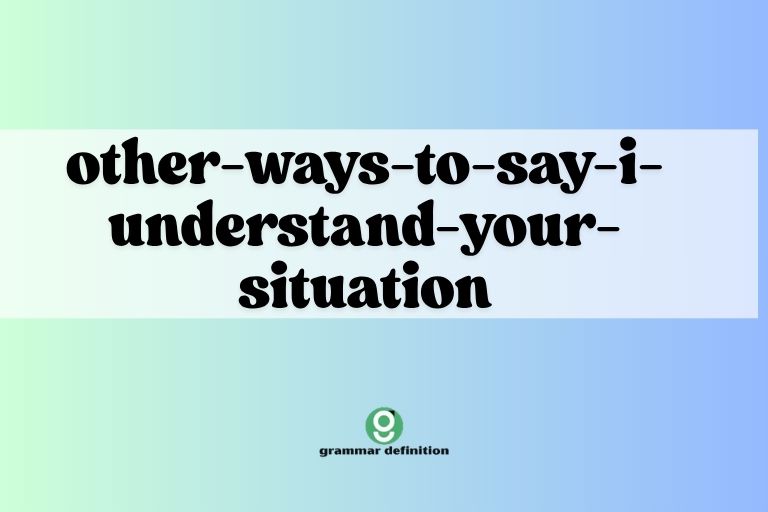Loose vs. Lose: Mastering the Correct Usage
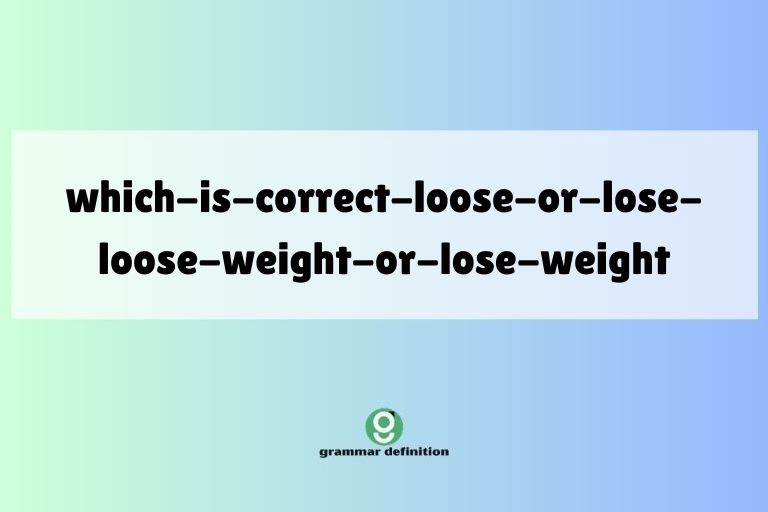
Understanding the difference between “loose” and “lose” is crucial for clear and effective communication in English. These words, though similar in sound, have distinct meanings and grammatical functions.
Confusing them can lead to misunderstandings and awkward phrasing. This article provides a comprehensive guide to mastering the correct usage of “loose” and “lose,” covering definitions, examples, usage rules, common mistakes, and practice exercises.
Whether you’re a student, writer, or English language learner, this guide will equip you with the knowledge and skills to confidently use these words correctly.
This article will benefit anyone who wants to improve their English grammar and writing skills. By understanding the nuances of “loose” and “lose,” you can avoid common errors and communicate more effectively.
Table of Contents
- Introduction
- Definitions of Loose and Lose
- Structural Breakdown
- Types and Categories
- Examples of Loose and Lose
- Usage Rules
- Common Mistakes
- Practice Exercises
- Advanced Topics
- FAQ
- Conclusion
Definitions of Loose and Lose
Understanding the definitions of “loose” and “lose” is the first step to using them correctly. These words have distinct meanings and grammatical roles in a sentence.
Loose
Loose primarily functions as an adjective, meaning not tightly fastened or secured. It can also function as a verb, meaning to release or set free. As an adjective, it describes something that is not firmly attached or contained. Consider a dog running ‘loose’ in the park. As a verb, it is less common but still valid, such as ‘loose the hounds’.
Here’s a breakdown of its common uses:
- Adjective: Not tightly fastened, detached, or free. Example: “The screw is loose.”
- Verb: To release or set free (less common). Example: “They loosed the arrows.”
Lose
Lose is a verb that means to suffer the loss of something, to be deprived of, or to fail to win. It describes the action of no longer having something, whether it’s a physical object, a game, or an opportunity. For example, one might ‘lose’ their keys, or ‘lose’ a competition.
Here’s a summary of its key meanings:
- Verb: To come to be without something; to fail to win. Example: “I don’t want to lose my wallet.”
- Verb: To misplace something. Example: “I always lose my keys.”
Structural Breakdown
Analyzing the structural roles of “loose” and “lose” helps to solidify their correct usage. Understanding how each word fits into a sentence is essential for grammatical accuracy.
Loose – Adjective and Verb
As an adjective, “loose” typically precedes the noun it modifies or follows a linking verb. For example, “a loose tooth” or “the rope is loose.” As a verb, it functions like other verbs, taking a subject and an object.
Example: The knight loosed his arrow.
Examples:
- Adjective: The belt is loose.
- Adjective: She wears loose clothing in the summer.
- Verb: The archer loosed the arrow.
Lose – Verb
“Lose” is a verb and therefore requires a subject and often an object. It indicates an action performed by the subject.
For example, “I lose my keys” or “They lose the game.”
Examples:
- I lose my keys all the time.
- They lose every match.
- He doesn’t want to lose his job.
Types and Categories
Both “loose” and “lose” can be further categorized based on their specific contexts and meanings.
Loose – Different Contexts
“Loose” can describe physical states, abstract concepts, or even moral character (though this is less common).
- Physical: Describing something not tightly held. Example: “The dog’s leash was loose.”
- Abstract: Describing something not strict or precise. Example: “They have a loose interpretation of the rules.”
Lose – Different Meanings
“Lose” can refer to losing physical objects, games, opportunities, or even weight.
- Objects: Misplacing or being deprived of something tangible. Example: “I always lose my glasses.”
- Games/Competitions: Failing to win. Example: “Our team will lose if we don’t practice.”
- Opportunities: Missing out on a chance. Example: “Don’t lose this opportunity to travel.”
- Weight: To reduce body mass. Example: “I want to lose weight before summer.”
Examples of Loose and Lose
The following examples illustrate the correct usage of “loose” and “lose” in various contexts. The tables below provide a clear comparison.
Examples of “Loose”
The table below shows examples of “loose” used as an adjective and verb.
| Category | Example Sentence |
|---|---|
| Adjective (Physical) | The button on my shirt is loose. |
| Adjective (Physical) | Her hair was loose and flowing in the wind. |
| Adjective (Physical) | The dog got loose from its leash. |
| Adjective (Abstract) | They have a loose interpretation of the contract. |
| Adjective (Abstract) | The rules are quite loose in this game. |
| Adjective (Abstract) | He has a loose grasp on the subject matter. |
| Adjective (Clothing) | She prefers to wear loose clothing in the summer. |
| Adjective (Clothing) | These pants are too loose around the waist. |
| Adjective (Fitting) | The lid on the jar is loose. |
| Adjective (Fitting) | The connection is loose, so the power keeps cutting out. |
| Verb (Archaic) | The archers loosed their arrows at the enemy. |
| Verb (Archaic) | The falconer loosed the hawk into the sky. |
| Adjective (Descriptive) | The sand was loose and shifted easily underfoot. |
| Adjective (Descriptive) | The soil is too loose for planting. |
| Adjective (Figurative) | He has a loose tongue and often says things he regrets. |
| Adjective (Figurative) | Their friendship is based on a loose agreement. |
| Adjective (Technical) | The electrical wire is loose. |
| Adjective (Technical) | The bolt is loose and needs tightening. |
| Adjective (Informal) | He’s a bit loose with his money. |
| Adjective (Informal) | She has a loose interpretation of the dress code. |
| Adjective (Physical) | The bandage is too loose; it needs to be tighter. |
| Adjective (Abstract) | The company has a loose policy on remote work. |
| Adjective (Clothing) | He bought a loose-fitting shirt for comfort. |
Examples of “Lose”
The following table provides examples of “lose” used in different contexts, such as losing objects, games, opportunities, and weight.
| Category | Example Sentence |
|---|---|
| Objects | I always lose my keys. |
| Objects | Did you lose your wallet again? |
| Objects | She doesn’t want to lose her phone. |
| Games/Competitions | Our team is going to lose if we don’t practice. |
| Games/Competitions | They don’t want to lose the championship. |
| Games/Competitions | He hates to lose at anything. |
| Opportunities | Don’t lose this opportunity to travel abroad. |
| Opportunities | She doesn’t want to lose the chance to interview for the job. |
| Opportunities | You shouldn’t lose sight of your goals. |
| Weight | I want to lose weight before my vacation. |
| Weight | He’s trying to lose a few pounds. |
| Weight | She needs to lose weight for health reasons. |
| Abstract Loss | They don’t want to lose their freedom. |
| Abstract Loss | He doesn’t want to lose his reputation. |
| Abstract Loss | She’s afraid to lose her mind. |
| Direction | We might lose our way in the forest. |
| Direction | They don’t want to lose track of the time. |
| Direction | It’s easy to lose your bearings in a new city. |
| Figurative | He started to lose his temper. |
| Figurative | She’s beginning to lose patience. |
| Abstract Loss | The company doesn’t want to lose market share. |
| Figurative | He doesn’t want to lose his train of thought. |
| Figurative | She’s afraid to lose control of the situation. |
Here is another table with more examples of both “loose” and “lose” for comparison.
| Word | Example Sentence |
|---|---|
| Loose | The dog is running loose in the park. |
| Loose | The screws on the chair are loose. |
| Loose | She prefers loose-fitting clothes. |
| Lose | I don’t want to lose my keys again. |
| Lose | Our team is likely to lose the game. |
| Lose | He needs to lose weight for health reasons. |
| Loose | The bandage felt loose and ineffective. |
| Loose | The connection was loose, causing intermittent power outages. |
| Loose | The fabric has a loose weave. |
| Lose | Don’t lose heart; keep trying! |
| Lose | They might lose their way in the dark. |
| Lose | She doesn’t want to lose her job. |
| Loose | The horse broke loose from its stable. |
| Loose | The soil is too loose for planting. |
| Loose | The definition is a bit loose and needs clarification. |
| Lose | He is trying to lose bad habits. |
| Lose | We can’t afford to lose any more time. |
| Lose | They are likely to lose their investment. |
Usage Rules
Understanding the rules for using “loose” and “lose” will help you avoid common errors. These rules cover grammatical function, context, and common exceptions.
Rules for Using “Loose”
When using “loose,” remember these rules:
- Use “loose” as an adjective to describe something that is not tightly fastened or secured.
- Use “loose” as a verb (less common) to mean to release or set free.
- Ensure that “loose” modifies a noun correctly or follows a linking verb.
Rules for Using “Lose”
When using “lose,” keep these rules in mind:
- Use “lose” as a verb to indicate the action of losing something, failing to win, or being deprived of something.
- Ensure that “lose” has a subject performing the action.
- Be mindful of the different contexts in which “lose” can be used (objects, games, opportunities, weight).
Common Mistakes
One of the most frequent errors in English grammar is confusing “loose” and “lose.” Here are some examples of common mistakes and their corrections:
| Incorrect | Correct | Explanation |
|---|---|---|
| I don’t want to loose my keys. | I don’t want to lose my keys. | “Lose” is the correct verb for misplacing something. |
| The belt is to tight; it’s loose. | The belt is too tight; it’s loose. | “Loose” is the correct adjective to describe something not tight. |
| They will loose the game if they don’t practice. | They will lose the game if they don’t practice. | “Lose” is the correct verb for failing to win. |
| My tooth is lose. | My tooth is loose. | “Loose” is the correct adjective to describe something wobbly. |
| I need to loose weight. | I need to lose weight. | “Lose” is the correct verb for reducing body mass. |
Practice Exercises
Test your understanding of “loose” and “lose” with the following exercises.
Exercise 1: Fill in the Blanks
Fill in the blanks with the correct word: “loose” or “lose.”
| Question | Answer |
|---|---|
| 1. I don’t want to ______ my wallet. | lose |
| 2. The dog got ______ from its leash. | loose |
| 3. She needs to ______ weight before summer. | lose |
| 4. The screws on the chair are ______. | loose |
| 5. They might ______ the game if they don’t try harder. | lose |
| 6. Her hair was ______ and flowing in the wind. | loose |
| 7. I always ______ my glasses. | lose |
| 8. The bandage is too ______. | loose |
| 9. Don’t ______ this opportunity. | lose |
| 10. He doesn’t want to ______ his job. | lose |
Exercise 2: Error Correction
Identify and correct the errors in the following sentences.
| Incorrect Sentence | Correct Sentence |
|---|---|
| 1. The button on my shirt is loose. | The button on my shirt is loose. (Correct – No Change) |
| 2. I don’t want to loose my keys again. | I don’t want to lose my keys again. |
| 3. She prefers to wear lose clothing. | She prefers to wear loose clothing. |
| 4. Our team is going to loose the championship. | Our team is going to lose the championship. |
| 5. He needs to loose some weight. | He needs to lose some weight. |
| 6. The dog got lose from its leash. | The dog got loose from its leash. |
| 7. I always loose my phone. | I always lose my phone. |
| 8. The connection is lose, so the power cuts out. | The connection is loose, so the power cuts out. |
| 9. Don’t loose sight of your goals. | Don’t lose sight of your goals. |
| 10. He hates to loose at anything. | He hates to lose at anything. |
Exercise 3: Sentence Construction
Create sentences using the following words in the correct context.
| Word | Example Sentence |
|---|---|
| Loose (button) | The loose button fell off my coat. |
| Lose (game) | We don’t want to lose the game tonight. |
| Loose (hair) | She let her hair hang loose down her back. |
| Lose (keys) | I often lose my keys in the house. |
| Loose (interpretation) | They have a loose interpretation of the rules. |
| Lose (opportunity) | He doesn’t want to lose the opportunity to travel. |
| Loose (clothing) | He prefers wearing loose clothing in hot weather. |
| Lose (weight) | She is trying to lose weight by exercising. |
| Loose (connection) | The loose connection caused the device to fail. |
| Lose (patience) | I began to lose my patience with the slow service. |
Advanced Topics
For advanced learners, understanding idiomatic expressions and subtle nuances can further refine their use of “loose” and “lose.”
Idiomatic Expressions
Certain idiomatic expressions use “loose” and “lose” in specific ways. Understanding these expressions can enrich your vocabulary and comprehension.
- “Cut loose”: To free oneself from restrictions or obligations. Example: “After finishing the project, she decided to cut loose and go on vacation.”
- “Lose your cool”: To become angry or agitated. Example: “He tends to lose his cool under pressure.”
- “Loose cannon”: Someone who is unpredictable and potentially dangerous. Example: “He’s a loose cannon, you never know what he’ll do next.”
- “Lose out”: To be unsuccessful or disadvantaged. Example: “Small businesses often lose out to larger corporations.”
Subtle Nuances
The words “loose” and “lose” can also carry subtle nuances depending on the context. For example, “loose” can imply a lack of control, while “lose” can suggest a sense of grief or regret.
Consider these nuances:
- Loose can imply a lack of precision or control. Example: “His argument was based on loose evidence.”
- Lose can carry a sense of regret or sadness. Example: “She felt a deep sense of loss after losing the competition.”
FAQ
Here are some frequently asked questions about the usage of “loose” and “lose.”
- What is the difference between “loose” and “lose” in simple terms?
Loose describes something that is not tight or secure, while lose means to misplace something or fail to win.
- How can I remember the difference between “loose” and “lose”?
Think of “loose” as the opposite of “tight,” and “lose” as the opposite of “find” or “win.”
- Is “loose” ever used as a verb?
Yes, but it’s less common. It means to release or set free, such as “loose the hounds.”
- Can “lose” be used in any other context besides misplacing objects or failing to win?
Yes, “lose” can also refer to losing opportunities, weight, or even abstract concepts like freedom or patience.
- What is the most common mistake people make with “loose” and “lose”?
The most common mistake is using “loose” when they mean “lose,” especially in phrases like “I don’t want to lose my keys.”
- Is it correct to say “loose weight” instead of “lose weight”?
No, it is not correct. The correct phrase is “lose weight,” meaning to reduce body mass. “Loose weight” doesn’t have a coherent meaning in this context.
- How do I practice using “loose” and “lose” correctly?
Practice by writing sentences using each word in different contexts. Review your writing and look for any instances where you may have confused the two words. Use online grammar tools or ask a teacher or tutor for feedback.
- Are there any other words that are commonly confused with “loose” and “lose”?
Yes, “loosen” (a verb meaning to make something loose) and “loss” (a noun meaning the act of losing something) are also frequently confused with “loose” and “lose.” Being aware of these words can help you avoid errors.
Conclusion
Mastering the difference between “loose” and “lose” is essential for clear and accurate communication in English. Remember that “loose” typically describes something not tightly fastened, while “lose” refers to the action of losing something.
By understanding their definitions, usage rules, and common mistakes, you can confidently use these words correctly in your writing and speech.
Continue to practice and review these concepts to reinforce your understanding. With consistent effort, you’ll avoid common errors and communicate more effectively.
Remember to pay attention to context and consider the specific meaning you want to convey. Good luck, and keep practicing!



